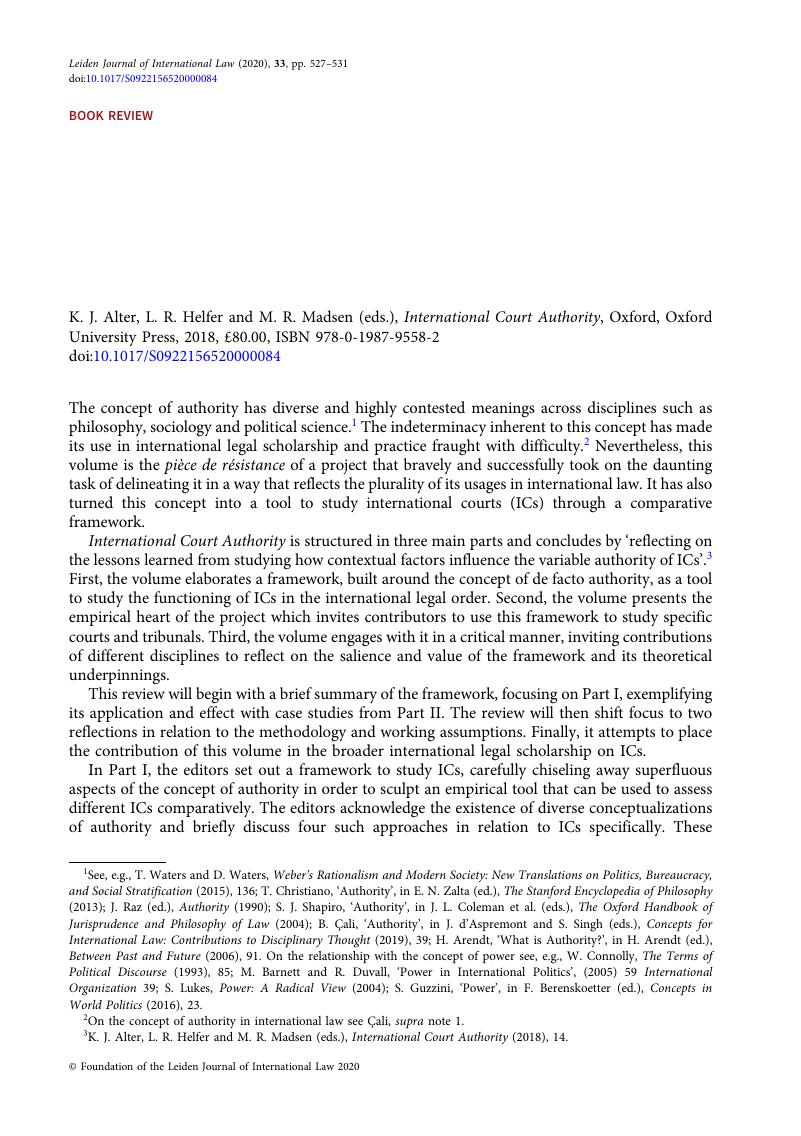No CrossRef data available.
Published online by Cambridge University Press: 27 February 2020

European University Institute, Department of Law, Villa Salviati, Via Bolognese 156, 50139 Firenze, Italy [[email protected]].
1 See, e.g., Waters, T and Waters, D, Weber’s Rationalism and Modern Society: New Translations on Politics, Bureaucracy, and Social Stratification (2015), 136Google Scholar; Christiano, T, ‘Authority’, in Zalta, E. N (ed.), The Stanford Encyclopedia of Philosophy (2013); Raz, J (ed.), Authority (1990)Google Scholar; Shapiro, S. J, ‘Authority’, in Coleman, J. Let al. (eds.), The Oxford Handbook of Jurisprudence and Philosophy of Law (2004)Google Scholar; Çali, B, ‘Authority’, in d’Aspremont, J and Singh, S (eds.), Concepts for International Law: Contributions to Disciplinary Thought (2019), 39CrossRefGoogle Scholar; Arendt, H, ‘What is Authority?’, in Arendt, H (ed.), Between Past and Future (2006), 91Google Scholar. On the relationship with the concept of power see, e.g., Connolly, W, The Terms of Political Discourse (1993), 85Google Scholar; Barnett, M and Duvall, R, ‘Power in International Politics’, (2005) 59 International Organization 39CrossRefGoogle Scholar; Lukes, S, Power: A Radical View (2004)Google Scholar; Guzzini, S, ‘Power’, in Berenskoetter, F (ed.), Concepts in World Politics (2016), 23CrossRefGoogle Scholar.
2 On the concept of authority in international law see Çali, supra note 1.
3 Alter, K. J, Helfer, L. R and Madsen, M. R (eds.), International Court Authority (2018), 14Google Scholar.
4 Ibid., at 24.
5 Ibid., at 28 (the agnosticism as to the why is explained for the purpose of creating a metric that can be used to compare authority across ICs).
6 Ibid., at 29.
7 Ibid.
8 Several indicators of whether an IC has de facto authority are outlined in Ch. 2 (in particular, at 34–6).
9 Ibid., at 31–3.
10 This is when the conjunctive standard of recognition and meaningful action standard is met by a wider field of both legal (e.g., bar associations, law firms, and scholars) and non-legal actors (e.g., civil society groups).
11 This is when the standard is met solely by the litigants.
12 L. Vinjamuri, ‘The International Criminal Court’, in Alter, Helfer and Madsen, supra note 3, at 331.
13 However, it is also acknowledged that judges themselves may play a role in influencing these contexts (see Alter, Helfer and Madsen, ibid., at 49–50).
14 On the idea of international law as a science see the recent contributions: Orford, A, ‘Scientific Reason and the Discipline of International Law’, in d’Aspremont, Jet al. (eds.), International Law as a Profession (2017), 93CrossRefGoogle Scholar; J. d’Aspremont, ‘The Professionalisation of International Law’, ibid., at 19.
15 Orford, ibid.
16 d’Aspremont, supra note 14.
17 A. Huneeus, ‘The Inter-American Court of Human Rights’, in Alter, Helfer and Madsen, supra note 3, at 219.
18 E. T. Achiume, ‘The SADC Tribunal’, in Alter, Helfer and Madsen, ibid., at 124.
19 Ibid., at 125.
20 Ibid., at 126.
21 See, for instance, Bourdieu, P, ‘The Scholastic Point of View’, (1990) 5 Cultural Anthropology 380CrossRefGoogle Scholar; see also Bianchi, A, ‘Reflexive Butterfly Catching: Insights from a Situated Catcher’, in Pauwelyn, Jet al. (eds.), Informal International Lawmaking (2012), 200CrossRefGoogle Scholar.
22 Mainly in response to Ian Hurd’s contribution in Ch. 22.
23 Alter, Helfer and Madsen, supra note 3, at 369.
24 M. Weber, Economy and Society (1978), as referenced in Alter, Helfer and Madsen, ibid., at 369.
25 Von Bogdandy and Venzke mention the element of procedural law-making and procedural cross-fertilization, and notice that developments in this area may be helpful for the exercise of public authority of ICTs in von Bogdandy, A and Venzke, I, ‘The Spell of Precedents: Lawmaking by International Courts and Tribunals’, in Romano, C. P. Ret al. (eds.), The Oxford Handbook of International Adjudication (2013), 504Google Scholar.
26 Alter, Helfer and Madsen, supra note 3, at 3.
27 M. Zürn, ‘International Courts’, in Alter, Helfer and Madsen, ibid., at 389.
28 Ibid., at 390.
29 See Hernández, G. I, ‘Judicialization of International Law: Reflections on the Empirical Turn’, (2014) 25 EJIL 919CrossRefGoogle Scholar.
30 See, e.g., Shelton, D, ‘Form, Function, and the Powers of International Courts Symposium: International Judges’, (2008) 9 Chicago Journal of International Law 537Google Scholar; Shany, Y, ‘No Longer a Weak Department of Power? Reflections on the Emergence of a New International Judiciary’, (2009) 20 EJIL 73CrossRefGoogle Scholar; Shany, Y, Assessing the Effectiveness of International Courts (2014)CrossRefGoogle Scholar; C. P. R. Romano et al. (eds.), supra note 25; Baetens, F, Legitimacy of Unseen Actors in International Adjudication (2019); Hayashi, N and Bailliet, C (eds.), The Legitimacy of International Criminal Tribunals (2017)CrossRefGoogle Scholar; Squatrito, Tet al., The Performance of International Courts and Tribunals (2018)CrossRefGoogle Scholar; Hernández, supra note 29; von Bogdandy, A and Venzke, I, In Whose Name?: A Public Law Theory of International Adjudication (2014)CrossRefGoogle Scholar; Cohen, H. Get al. (eds.), Legitimacy and International Courts (2018)CrossRefGoogle Scholar; Howse, R (ed.), The Legitimacy of International Trade Courts and Tribunals (2018)CrossRefGoogle Scholar; Føllesdal, A and Ulfstein, G (eds.), The Judicialization of International Law: A Mixed Blessing? (2018)CrossRefGoogle Scholar.
31 See Brower, C. N and Litwin, D, ‘Navigating the Judicialization of International Law in Troubled Waters: Some Reflections on a Generation of International Lawyers’, (2019) 37 Berkeley Journal of International Law 171Google Scholar.
32 See also Hernández, supra note 29.
33 Alter, Helfer and Madsen, supra note 3, at 26.
34 Ibid., at 26–7.
35 Ibid., at 374.